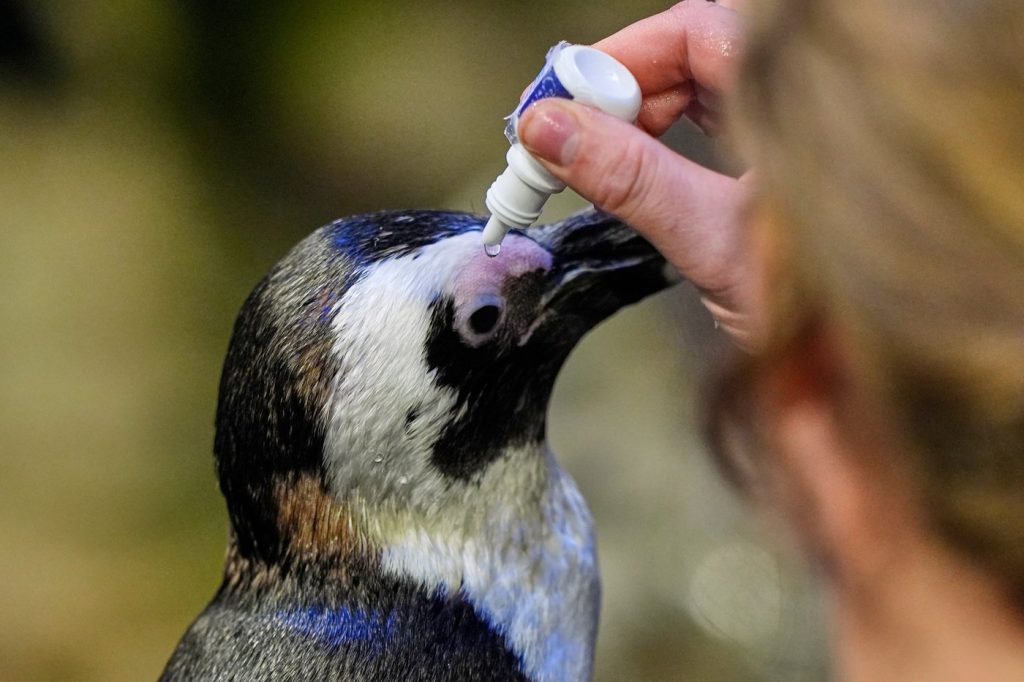BOSTON (AP) – Lambert, a critically endangered African penguin at the New England Aquarium in Boston, has experienced a decline in vision and mobility with age. As a result, it became evident that he required a more suitable living environment to age safely alongside his companions. Rather than placing him in a conventional nursing home, the aquarium decided to create a unique geriatric island for Lambert and six other aging penguins, which was announced in February.
Eric Fox, the associate curator of penguins at the aquarium, described the initial idea as somewhat humorous, saying, "It sort of started off as a joke. It’s like, ‘Oh, well, why don’t we give them an old folks home?’" However, as the team began analyzing welfare data and understanding the physical limitations and ailments faced by older penguins, it became clear this concept had merit. The geriatric island ensures that the older penguins do not need to compete for territory with the more aggressive younger members of their species.
This specially designed rocky island is located near the aquarium's entrance and features flatter terrain and a carpeted path leading to the water, making it easier for Lambert and his companions to navigate. The aquarium has also added a stand in front of the island to facilitate easier access for the penguins exiting the water.
Mia Luzietti, a senior penguin trainer, noted that since moving to the new enclosure, Lambert has shown increased activity, swimming more often with his mate and leaving the island more frequently. This initiative highlights a growing concern in zoos and aquariums regarding the care of aging animals who, due to improved living conditions, often exceed their expected lifespans. Some African penguins can live into their 30s or even 40s, double the lifespan they would experience in the wild, where they face dangers such as pollution and overfishing impacting their food supply.
Luzietti emphasized the importance of adapting care practices to support the well-being of longer-living animals. She stated, "As we learned how long these animals could live, if given an optimal environment, that we evolved with that." The goal of the geriatric island is to provide the oldest penguins with a comfortable, slower lifestyle as they continue their lives at the aquarium.
To ensure the older birds receive exceptional care, they undergo more frequent checkups than their younger counterparts. The veterinarians provide treatments for common age-related ailments such as arthritis and joint pain, including supplements and anti-inflammatory medications, along with eye drops for conditions like glaucoma. To facilitate better monitoring, additional cameras have been installed around the enclosure, allowing staff to observe the penguins closely.
A recent visit to the geriatric island found Luzietti attending to Lambert, who appeared content while perched at the top of the island with his mate, Dyer III. The two penguins engaged in preening and occasionally vocalized with calls reminiscent of a donkey's bray. Lambert has previously undergone surgery to remove his left eye due to infection, and he currently suffers from glaucoma in his right eye and chronic inflammation.
On this particular day, Luzietti coaxed Lambert down from his perch for his daily dosage of eye drops, and a small crowd gathered to observe. Among them was Terri Blessman, a 69-year-old tourist from Canton, Illinois, who was pushed in a wheelchair by her friend Lou Ann Delost. Blessman expressed empathy for Lambert's condition, saying, "That’s wonderful. All of us older people need extra care as we get older."
Through the establishment of the geriatric island and a dedicated care regimen, the New England Aquarium is setting a new standard for the compassionate treatment of elderly animals in captivity, particularly as the ages of zoo inhabitants continue to increase.












